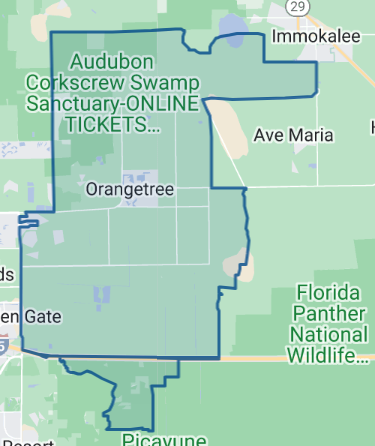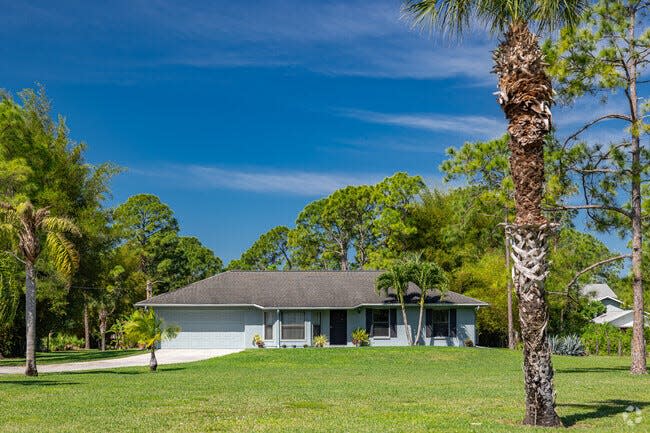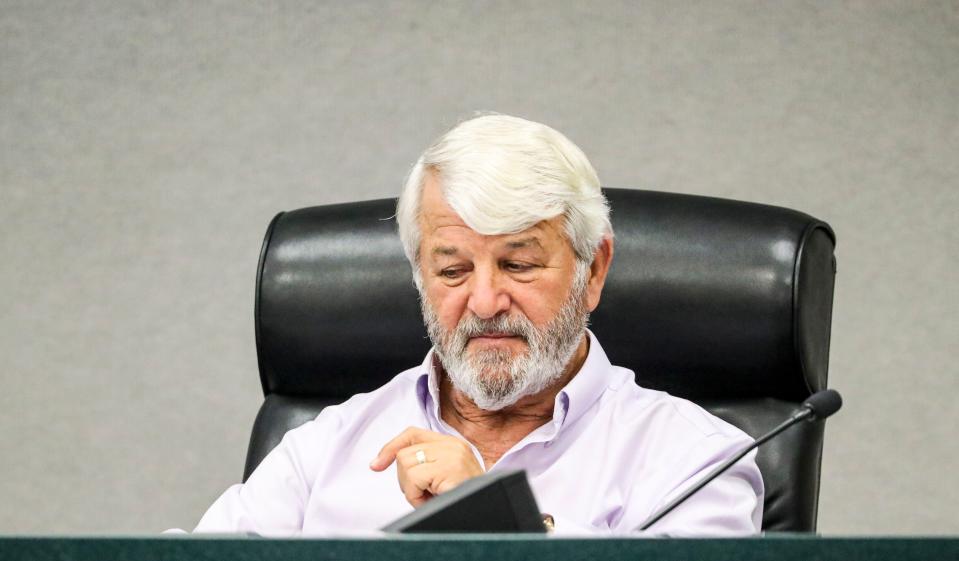Naples pilot program could turn guesthouses into workforce housing in Urban Estates
In the Urban Estates, guesthouses could one day take on a new meaning and purpose.
The houses could provide more affordable housing, addressing a critical shortage in Collier County.
At a board meeting May 14, county commissioners gave the greenlight to move ahead with legalizing the rentals, but only in the urban area of the estates, west of Collier Boulevard.
Commissioner Bill McDaniel proposed the idea, as a way to provide more affordable housing to teachers, firefighters and other essential workers, saying it could be a pilot or test case for other parts of the county.
"I am wholeheartedly in support of this," he said. "To me, this is simple economics. Supply and demand. If we have more units available, the opportunity for housing affordability will inevitably transpire."
Under the county's land development code, guesthouses can only be used by relatives or caregivers, and not for commercial gain. So, the code must be changed to allow for it.
Changing the code is a multi-step process that will take months.
Proposed changes will require a comprehensive review by county staff to identify and address any concerns. Then the county's Development Services Advisory Committee and Planning Commission will have to weigh in before a final vote by county commissioners.
Based on all of the required steps, the board isn't likely to make a definitive decision on the changes until the spring of next year, explained Mike Bosi, the county's director of planning and zoning.

Smaller houses equals smaller rents
While the rents would not be income-restricted for the guesthouses, they're likely to be much more affordable based on their smaller footprint. Guesthouses are limited to 40% of the primary home's square footage, under county rules, Bosi said.
Rents in the area ranged from $4,770 a month for a two-bedroom to $6,323 for a four-bedroom home last year, he said, but that's based on a larger footprint for a primary home.
"It is a bit overinflated," Bosi said, to what might be charged for a guesthouse.
He added that rents have likely cooled a bit, too, since the analysis of the market area.
Under the proposal, guesthouse rentals would be limited to "homestead-exempted" properties, or properties with single-family homes on them that serve as the primary, or main residences for their owners, and qualify for a property tax break as a result.

With that limitation, homeowners could act as a "gatekeeper," and closely monitor their renters' behaviors and actions to keep them in line, limiting damage to the property or disruption to the neighborhood, Bosi said.
The Urban Estates include parts of North Naples and Golden Gate Estates.
Only 'homesteaded' properties could be rented
Of the 2,752 properties with single-family homes on them in the targeted area, only 1,560 have a homestead exemption on them – or less than 60% of the total, Bosi shared.
"The order of magnitude is not a flooding of the market," he said. "There is a limitation in terms of the impact this can have."
After a bit of debate, county commissioners voted 4-1 in favor of moving ahead with the necessary code changes.
Commissioner Burt Saunders voted against the idea, raising concerns about the impact of the rentals on the more rural way of life in the Urban Estates. The rentals, he said, could further burden the area's infrastructure, including the major collector roads, such as Immokalee, Santa Barbara and Pine Ridge, which are already "very heavily over trafficked."
Saunders warned the guesthouses could become daily or weekly rentals, with the county's hands tied on regulating them based on state law. If so, he said, they could be used by tourists, rather than workers, defeating the purpose.

"I can tell you that's what you're going to have. You cannot stop it," he said.
He described the proposal as short-sighted.
"If you open this door, you’re going to destroy the quality of life in the Urban Estates, in my view. I live in the Urban Estates," Saunders said.
McDaniel and other commissioners disagreed, saying they didn't expect to see a big impact on the character of the more rural area.
Rentals targeted at the 'working class'
Commission chairman Chris Hall said if guesthouses are rented out in the area, it's not going to turn into a Miami, or a parking lot, a fear that's often expressed by county residents who are opposed to growth.
He stressed the program would be limited to 1,500 properties, so it would not be widespread, and argued it would not create "beachside short-term rentals," as they wouldn't be near the water.
"I'm willing to increase the inventory out there," Hall said. "I don't think it's going to be the wild, wild west, that the naysayers say it could be. And if it is, we'll correct it. But we've got to do something to increase inventory for our working-class people."
He pointed to the lackluster response to a county survey seeking the property owners' feedback about the proposal. The county received a total of 135 responses to an online survey, after sending notices to the owners of 3,558 properties in the Urban Estates, and holding three informational meetings, which had limited attendance.

From the survey results, Commissioner Dan Kowal said it appeared an "awful lot don't care" whether guesthouses can be rented out in their neighborhoods.
"It sounds like a large number didn't have an opinion one way or the other," he commented.
Those who don't like the idea won't rent out their guesthouses – or won't build guesthouses for that purpose if they don't have them in their backyard already – so in that way the program could be self-limiting, Kowal reasoned.
If the guesthouses are used by relatives or caretakers anyway, he said, renting them out instead isn't going to "100% increase traffic."
As the proposal moves ahead, the county plans to keep the survey open. There will be more public meetings as the process moves along, too, allowing for more community input.
"Just the invite to come out and discuss renting of guesthouses is a tough ask to get a lot of feedback," Bosi said. "But if we're in the process of amending the code to allow it and it becomes more of a reality, I think you'll get much more participation from our citizens."
Commissioner Rick LoCastro said if the rental program is allowed it would have to be kept under close scrutiny, to ensure it doesn't create any unintended consequences.
"To me, this one is a little bit of a dice roll," he said.
Moving it forward, he said, however, would allow for more vetting, so he didn't see any harm in it.

More like this: Collier commission advances affordable housing project that would tap taxpayer money
And: Collier commissioners tweak county rules for affordable housing built under Live Local Act
Program would require a one-year review
The board unilaterally agreed there should be a one-year review of the program, if implemented, including a look at any code violations or enforcement actions, and any harmful impacts on roads, or other community infrastructure.
Such a review would be helpful in determining whether the pilot should be expanded, with the next logical discussion being whether to allow guesthouse rentals in the Rural Estates, farther east, if the pilot works out as intended, McDaniel said.
He said he hadn't proposed doing it in the Rural Estates just yet since the area could be more burdened by it, with less infrastructure to support it.
Several commissioners questioned the tax implications of the program.
Lot splits could be required to allow for the rentals, which could then be taxed at a different rate, without the owners losing their homestead exemption, said Jeffrey Klatzkow, the county attorney. The exemption allows for a reduction of up to $50,000 on the assessed value of a primary home only.
Klatzkow likened the process of commercializing the guesthouses to a rezoning.
The need for more affordable housing is great in the county.
A 2021 report by the University of Florida Shimberg Center for Housing Studies and The Bureau of Economic and Business Research found nearly 50,000 households are cost-burdened, meaning they spend more than 30% of their monthly income on housing. Many of them spend more than 50%.
The pilot program would only make a small dent in that number. While it may not fix the problem, Kowal said it would be a move in the "right direction," not only helping the renters, but the owners make ends meet, with higher living costs taking a bigger bite out of everybody's wallets.
"A lot of people are hurting," he said. "On both sides."
This article originally appeared on Naples Daily News: Naples program would allow guesthouse rentals in Urban Estates

